Masarat
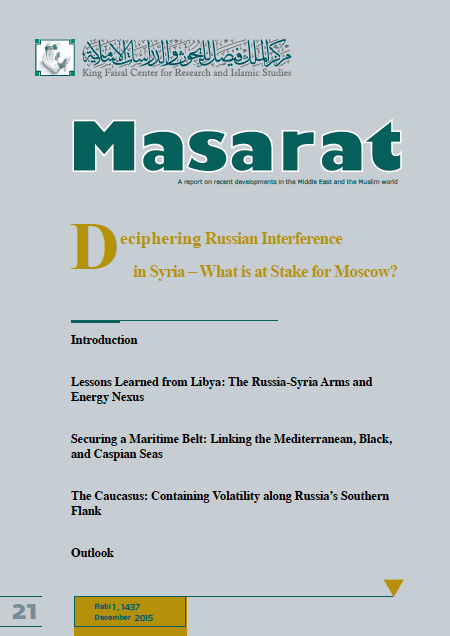
Number:
Author:
Masarat 21st issue, published December 2015/Rabi Al-Awwal 1437 Hijri.
‘Deciphering Russian Interference in Syria: What is at Stake for Moscow?’
Amid the turmoil in the Levant, a region entangled in the Syrian civil war for over four years, a significant change in trajectory has recently taken place. In mid September 2015, Russian armed forces deployed along the Syrian Mediterranean coast in the La
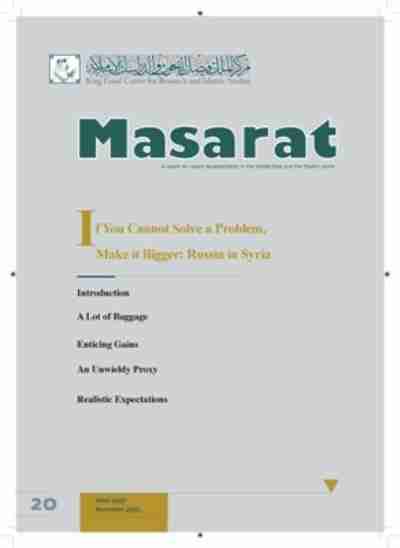
Number:
Author:
The 20th Masarat issue, published November 2015/Safar 1437.
When Russia jumped into the fray, adding yet another layer of complexity to the already intractable Syrian conflict, commentators and politicians responded predominantly by projecting their hopes unto a game-changer seen as shifting a hurting stalemate toward its denouement. The prospect of a dangerous escalation making the crisis even more difficult to solve was largely dismissed, based on a rather speculative and wishful understanding of Russia’s intentions or capacities.
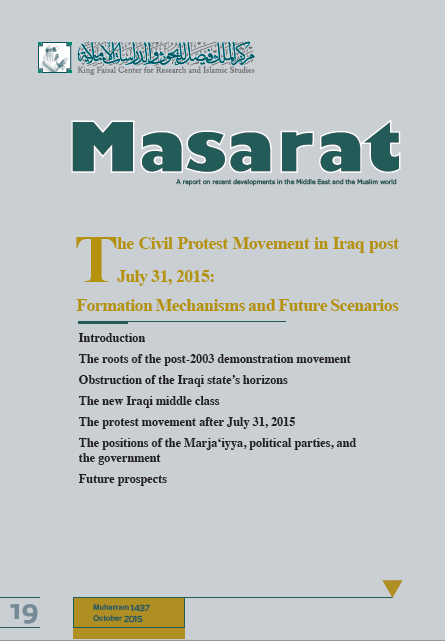
Number:
Author:
The 19th Masarat issue, published October 2015/Muharram 1437.
This study, looks at the civil protest movement in Iraq post July 31, 2015 from two angles: first, by analyzing the alliance of the three influential forces of the reform movement (the protesting masses, the religious authority of the Marja‘iyya led by Sistani, and Prime Minister Haider Al-Abadi) and second, by examining the convergence of grassroots demands for actual change from policymakers.
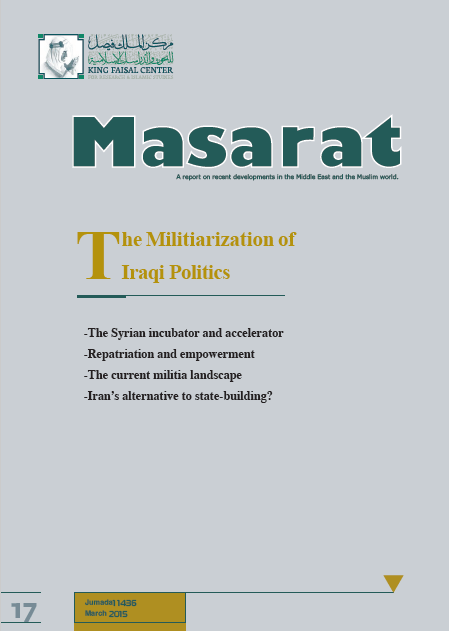
Number:
Author:
Issue 17. Jumada1 1436 18 March 2015>
Abstract:
As mainstream narratives focus on the truly horrendous forms of violence carried out against Iraqi and Syrian civilians by the so-called “Islamic State,” little attention is being paid to the many acts being carried out against national unity and state-institutions in Iraq and Syria at the hands of extremist movements of militant Shiite ideologies. Too often dismissed as merely an effect or unfortunate consequence of their Sunni equivalent, Shiite militia
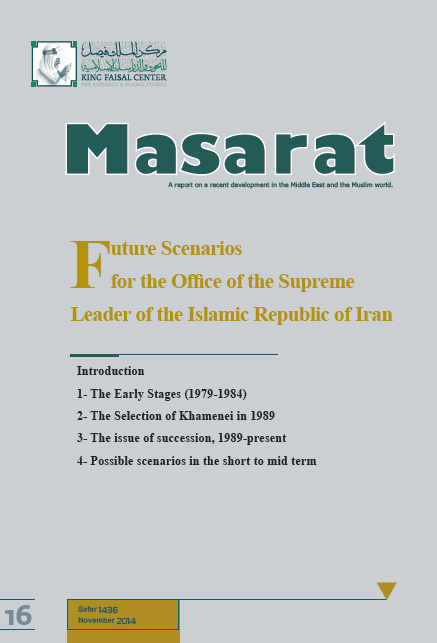
Number:
Author:
Issue 16. November 2014 (Safar 1436 H.)
Abstract:
The succession mechanisms and processes for the Supreme Leader post in the Islamic Republic have been one of the more contentious and nebulous elements in post-revolutionary Iran’s statecraft. A unique position, which is not immediately comparable to other “summit” institutions of modern state systems, such as the presidency of a republic, the helm of a monarchy, or the highest military rank in a junta, the Supreme Leader in Iran is effectively an irreplacea
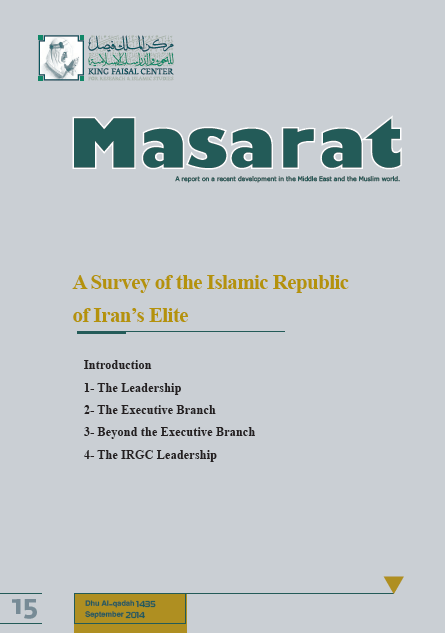
Number:
Author:
Issue 15. September 2014 (Dhu Al-qadah 1435 H.)
Abstract:
One of the defining features of the present-day Islamic Republic of Iran is the unique nature of its political class. “Political class” here is taken to mean the segment of society which holds incumbency in state institutions, according to the definitions of Gaetano Mosca and others. The Islamic Republic’s ruling elite is at once restricted and diverse. It encompasses a complex mix of pious laity and Shi’ite clergy of various levels and promine
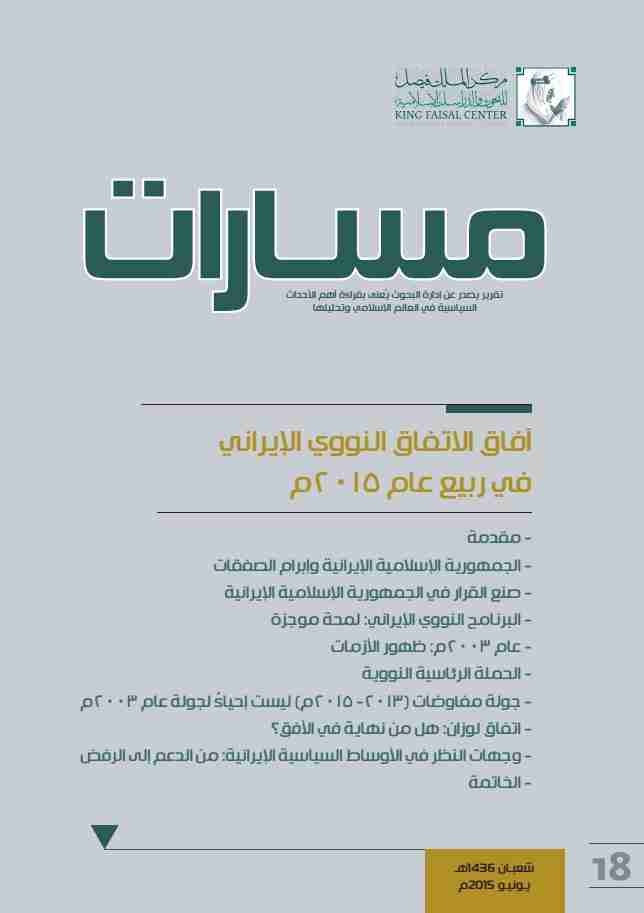
Number:
Author:
Issue 18. Shaban 1436 – June 2015
Abstract:
On April 3, 2015, the Iranian and 5+1 delegations emerged from exhausting negotiations in Lausanne, Switzerland, to announce the preamble of the first major agreement on the Iranian nuclear program since the now-defunct Tehran Declaration issued by Brazil, Turkey, and Iran in 2010. If finalized and put into practice after June 30, the agreement potentially signals the end of the diplomatic confrontation between Iran and the West on the former’s atomic program, which has
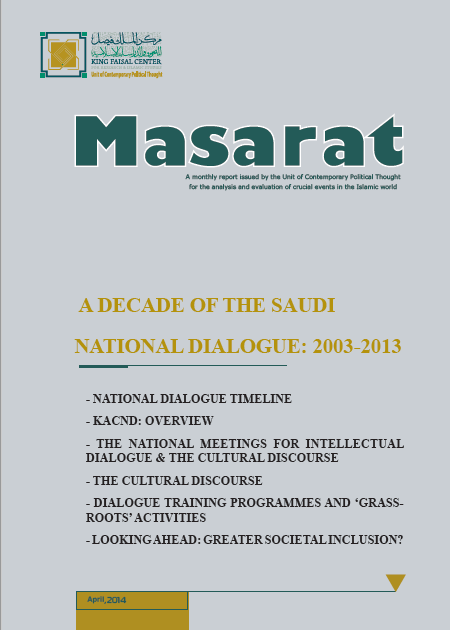
Number:
Author:
Issue 13. April 2014 (Jamada Al-Awla 1435 H)
Abstract:
This issue of Masarat is based on fieldwork in the Kingdom conducted from October 2009 to April 2014. This included qualitative interviews throughout Saudi Arabia with, amongst others: participants in the National Dialogue activities listed (male and female), KACND officials, government ministers, lawyers, journalists, focus groups and members of minority constituencies.
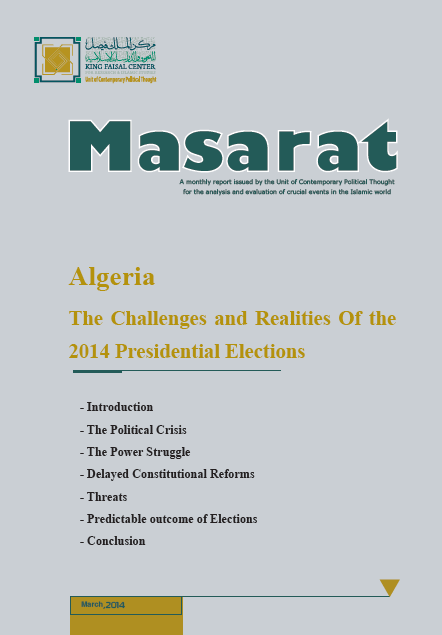
Number:
Author:
Issue 12. March 2014. (Rabi’ Al-Thani 1435 H.)
Abstract:
Algeria is undergoing conflict between its loci of power in light of growing discord between those who call for a boycott of the elections and those who advocate participation in voting. This issue of Masarat will shed light on preparations taking place in Algeria for the elections and reactions to President Bouteflika’s decision to run for a fourth term despite his deteriorating health. It will also discuss the role the intelligence service has playe
